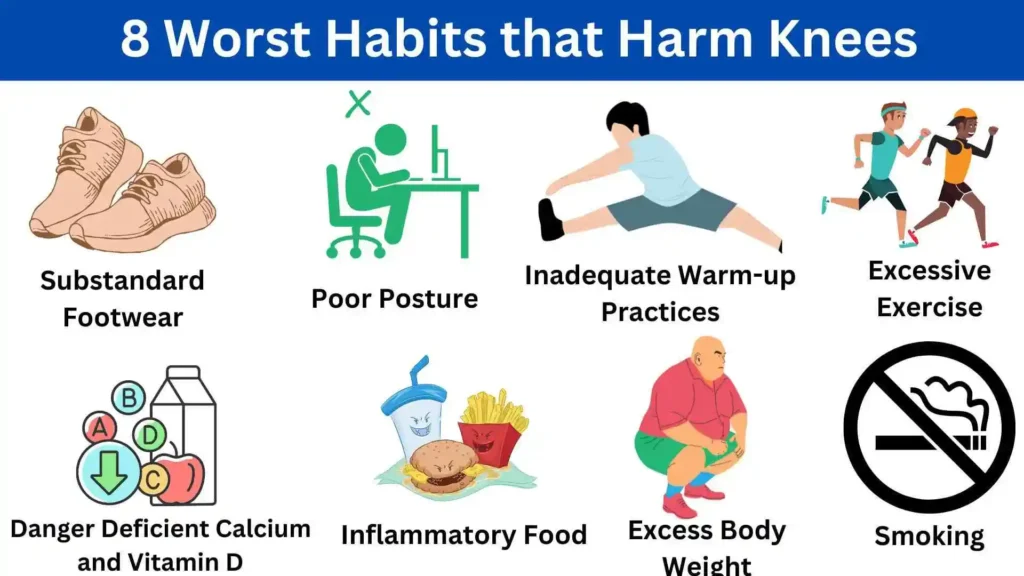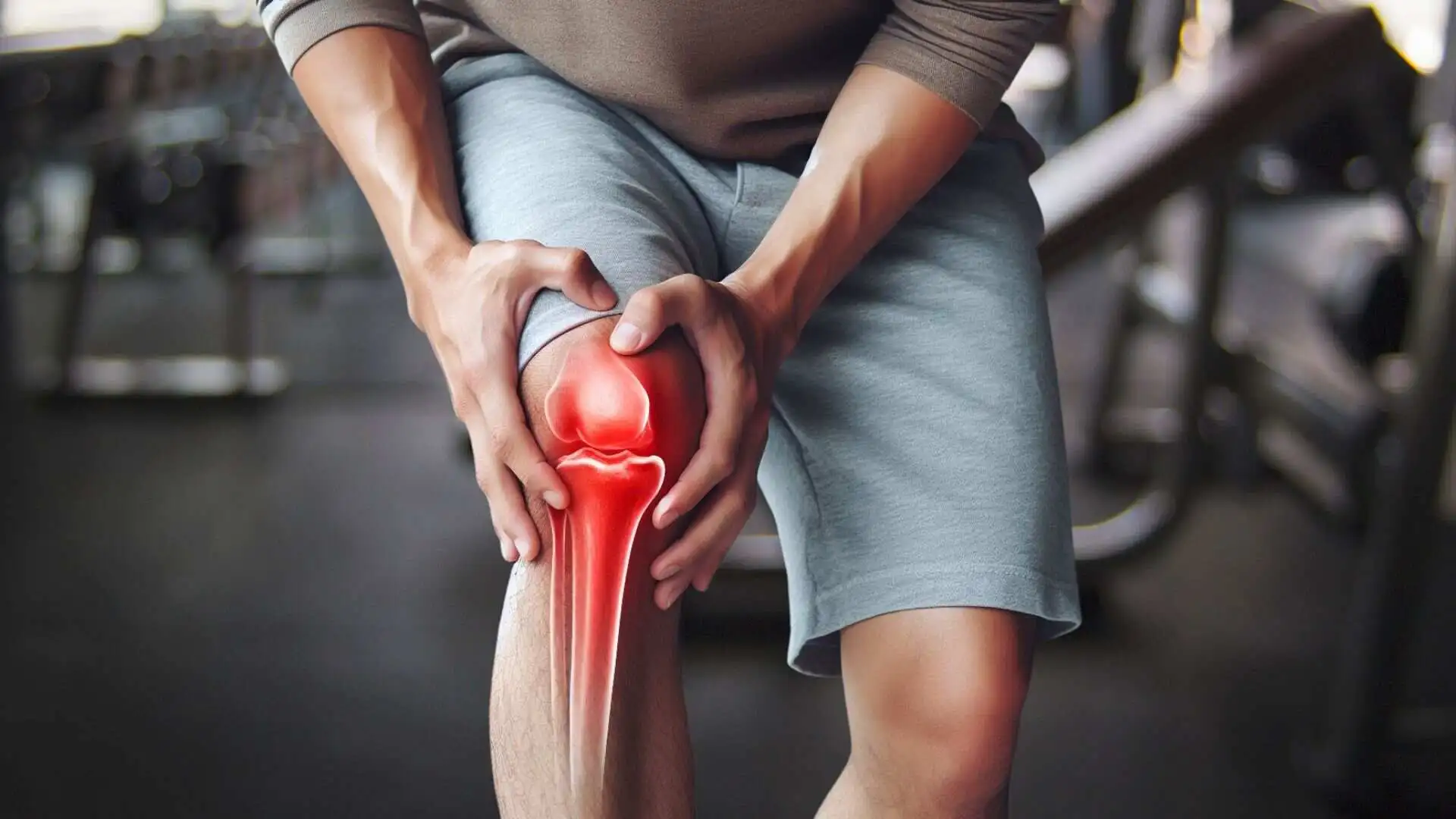Have you ever experienced knee pain? If so, then you are certainly involved in bad knee habits. Any worst habit that harms knees is the major cause of knee posture problems and pain.
As you know, the knee is regarded as one of the largest joints in our body because it facilitates various movements like walking, jumping, climbing, etc. Knee pain is one of the worst types of pain, as it can hinder our ability to walk properly.
It is crucial to care for every part of your body before it worsens.
We often associate knee pain with aging, but nowadays, people of all ages are experiencing this type of pain. The blog explores some of the worst habits that harm knees and cause knee posture problems.
Table of Contents
Top 8 Worst Habits that Harm Knees
Let’s come together to delve into some of the bad knee habits. The following 8 habits can negatively impact your knees:

1. Substandard Footwear Selection
To commence with, your choice of shoes lays the foundation upon which your whole body reclines. But can the wrong shoes cause knee pain?
Wrong shoes can greatly harm your knees and back. Sometimes, even a slight issue in the style, type, and construction of shoes can have negative effects on the overall posture of the body.
For instance, wearing tennis shoes during normal daily activities can inflict pain on your knees. Other shoe types like stilettos and thongs are two of the worst choices, as they place surplus stress on your knees, leading to pain.
So, the habit of substandard footwear is one of the worst habits that harm knees. These shoes lack the stability needed to support your feet during various activities. For example, in childhood, my cousin used to wear shoes that didn’t fit him, which caused him pain in his knees.
Therefore, it is crucial to invest in high-quality shoes that provide support, stability, and cushion.
2. Poor Posture
Posture plays a chief role in knee health. Habits that lead to poor posture, such as slouching or sitting with crossed legs, cause misalignment. It can affect the alignment of the pelvis and spine, which in turn can affect knee alignment, which increases the stress on it.
Poor posture can create knee posture problems. For example, if you slouch or hunch forward, you may have immoderate weight in front of your knees, which can cause pain over time.
Similarly, flat feet or collapsed arches contribute to poor posture by altering the alignment of the lower body. This can result in overpronation (excessive inward rolling) of the feet while walking or standing.
According to the National Library of Medicine, “misalignment of knees increased the risk of conditions such as patella femoral pain syndrome or medical knee pain. The most common postural deformity most people suffer from is Forward Head Posture, also known as FHP”.
However, improving posture exercises and stretches can help reduce strain on knees.
3. Inadequate Warm-up Practices
After exercise, the habit of inadequate warm-up practices can lead to serious injury. It is the human attitude to start something quickly without having proper knowledge of it.
Inadequate warm-up practice is one of the worst habits that harm knees. For this reason, before exercise, you have to prepare your muscles and joints for movement for at least 10 minutes before doing any physical activities.
If people do not engage in effective warm-up practices, they are more likely to experience knee damage or injuries during exercise. If you are not doing adequate warm practices before exercise, then your tight muscles put extra stress on your knees, ultimately leading to worse knee pain.
4. Excessive Exercise
Making exercise habits is essential for physical health and well-being, but overdoing can have detrimental effects on your body, including your knees.
Doing excessive exercise without any guidance from a professional is a bad knee habit. It can accelerate wear and tear on the joint surfaces, increasing the risk of conditions such as osteoarthritis and cartilage damage.
As Abelson says, “I have patients who do triathlons in their 50s and 60s without hurting their joints because they have trained slowly and carefully to build stamina and strength.”
It’s crucial to seek guidance from a healthcare professional or a qualified fitness trainer to adjust your exercise regimen accordingly.
5. Dangers of Deficient Calcium and Vitamin D
Calcium and vitamin D play crucial roles in maintaining strong and healthy bones. Getting less calcium and vitamin D is also the worst habit that harms knees.
Research published in the International Journal of Rheumatic Diseases suggests that low levels of vitamin D are linked to an increased prevalence of knee osteoarthritis and may contribute to disease progression and severity.
Hypercalcemia, or low levels of calcium in the blood, can lead to calcium deficiency symptoms such as muscle aches and fatigue. Long-term calcium deficiency can lead to cataracts and osteoporosis, which can cause the bones to become brittle.
Most people are suffering from severe knee pain due to a deficiency of Calcium and vitamin D, but they are unable to recognize this lack. This habit leads to severe consequences for your knee health.
6. Consuming Foods that Ignite Inflammation
Swollen knee leads to inflammation that occurs when excess fluid collects in or around your knee joint. Certain foods may ignite inflammation of the knees and contribute to knee pain, discomfort, and knee posture problems.
If you have knee arthritis, try to restrict these foods that trigger inflammation:
- Alcohol
- Those high in refined carbohydrates
- Unhealthy fats
- Sugar-sweetened beverages
- Fried foods
- Proceed meat
Intake of these foods can contribute to weight gain, and obesity adds stress to the knees, increasing the risk of knee pain, injuries, and degenerative conditions.
People with knee arthritis focus on developing healthy eating habits, such as an anti-inflammatory diet rich in fruits, vegetables, and whole grains.
7. Excess Body Weight
Obesity is a risk factor for the development and progression of osteoarthritis. Individuals with excess body weight may experience prolonged recovery times following knee injuries or surgeries.
Having excess body weight and not trying to reduce it is also the worst habit that harms the knees. It has harmful effects on the whole body, especially it puts stress on the knee.
One must control body weight by adopting a balanced diet and increasing physical activity. Weight management programs can help reduce the burden on the knees and improve overall joint health.
In our daily lives, we see aged people being overweight and suffering from severe knee pain. So when they consult with doctors, they are advised to reduce weight through physical activities or to overcome their cholesterol levels.
You can also learn about the best books on habits for developing good ones.
8. Smoking
Smoking is an addiction that has been linked to decreased bone density and impaired healing, which can contribute to knee problems and delay recovery from injuries.
This is because nicotine in cigarettes narrows down blood vessels and, as a result, restricts the amount of oxygen and critical nutrients that reach the joint cartilage.
According to the American Academy of Orthopaedic Surgeons, people who smoke are 30 to 49 percent more likely to break their hips than their non-smoking counterparts.
Everybody knows that smoking is injurious to health and one of the worst habits that harm knees. But nobody cares that slowly and gradually, you are moving yourself towards death while being engaged in smoking.
Explore habit vs. addiction to understand when you develop an addiction like smoking.
Benefits of Knee Strength and Flexibility
Avoiding the worst habits that harm knees and investing in their strength and flexibility contributes to joint health, promoting longevity and reducing the likelihood of developing chronic conditions later in life.
Strong and flexible knees contribute to better overall posture and lower, as they support proper alignment of the entire body.
Moreover, the benefits are as follows:
- Knee strengthening exercises strengthen the muscles surrounding the knee joint.
- Strong, flexible muscles can also keep knees healthy and prevent injury.
- Flexibility in the knees can boost confidence levels and contribute to overall mental well-being because it increases the blood flow to muscles and cartilage. It also helps to increase the delivery of nutrients to the muscle and reduce muscle soreness.
- Knee Strength reduces the stress and anxiety related to physical limitations.
- Maintaining strong and flexible knees supports an active lifestyle and enhances quality of life.
Importance of Seeking Medical Advice
Some people who are suffering from knee pain first try remedies at home. This can cause their pain to worsen and may lead to the development of chronic diseases.
Therefore, it is crucial to seek professional guidance if you experience severe pain, swelling, or no improvement after a few weeks, or if your knee locks and clicks painfully.
Seeking timely medical advice is an important preventative habit that can help prevent these complications by addressing the underlying issue promptly.
Individuals also gain knowledge about their knee health, including risk factors, preventive measures, and self-management strategies. This awareness lets them take an active role in their health and avoid the worst habits that harm their knees and create knee posture problems.
Conclusion
The worst habit that harms knees poses significant risks to the health and functionality of the knees. From poor posture and sedentary lifestyles to overtraining and ignoring pain, these behaviors can lead to a multitude of knee issues.
These bad knee habits lead to certain injuries, chronic pain, and degenerative conditions like osteoarthritis. One must recognize these habits and make proactive changes to promote the long-term health of their knees.
FAQs
What mistakes make bad knees worse?
People sit down and don’t try to find remedies when their knees hurt, but this can weaken muscles and often exacerbate knee pain. To address this issue, it’s important to find ways to get moving without causing further discomfort. Incorporating gentle exercises tailored for individuals with knee pain can be beneficial for the knee joint.
Does neglecting flexibility and strength training harm knee health?
Yes, neglecting flexibility and strength training can contribute to muscle imbalances and reduce joint stability, increasing the risk of knee injuries or pain. Embody exercises that target the muscles around the knees can help support joint health and function. Avoiding the worst habit that harms the knees can also give strength to the knees.
Can chronic stress or anxiety contribute to knee pain or discomfort?
Yes, chronic stress or anxiety can contribute to muscle tension and affect posture. This leads to increased strain on the knees and related discomfort. Practicing stress management techniques such as relaxation exercises, meditation, and regular physical activity can help reduce stress levels and promote overall knee health.
What if your knees are completely damaged? Is there any way of replacing them?
Yes, if your knees are completely damaged, then they can be cured or replaced through surgery. If surgery is necessary, orthopedic surgeons can perform various procedures to repair or reconstruct damaged knee structures. To reduce the risk of completely damaging your knees, you must avoid any worst habit that harms knees.




